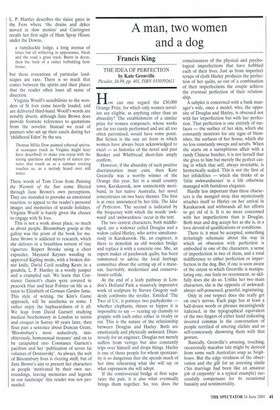A man, two women and a dog
Francis King
THE IDEA OF PERFECTION by Kate Grenville
Picador, .E6.99, pp. 401, ISBN 0330392611 How can one regard the £30,000 Orange Prize, for which only women novelists are eligible, as anything other than an absurdity? The establishment of a similar prize for women composers, whose works are far too rarely performed and are all too often patronised, would have some point. But fiction is the one art form in which women have always been acknowledged to excel — as histories of the novel and past Booker and Whitbread short-lists amply confirm.
However, if the absurdity of such positive discrimination must exist, then Kate Grenville was a worthy winner of the Orange this year. Set in a small country town, Karakarook, now somnolently moribund, in her native Australia, her novel concentrates on two basic themes. The first is at once announced by her title, The Idea of Perfection. The second is indicated by the frequency with which the words 'awkward' and 'awkwardness' occur in the text.
The two central characters, both middleaged, are a widower called Douglas and a widow called Harley, who arrive simultaneously in Karakarook. He, an engineer, is there to demolish an old wooden bridge and replace it with a concrete one. She, an expert maker of patchwork quilts, has been summoned to advise the local heritage committee about the setting up of a museum. Inevitably, moderniser and conservationist collide.
At the end of a leafy pathway in London's Holland Park a massively impressive work of sculpture by Steven Gregory suddenly confronts the stroller. Entitled The Two of Us', it portrays two pachyderms — whether elephants, rhinos or hippos it is impossible to say — rearing up clumsily to grapple with each other either in rivalry or rut. This is the nature of the relationship between Douglas and Harley. Both are emotionally and physically awkward. Disastrously for an engineer, Douglas not merely suffers from vertigo but also constantly trips over himself and drops things. Harley is one of those people for whom spontaneity is so dangerous that she spends much of her time rehearsing what she will say or what expression she will adopt.
If the controversial bridge at first separates the pair, it is also what eventually brings them together. So, too, does the consciousness of the physical and psychological imperfections that have hobbled each of their lives. Just as from imperfect scraps of cloth Harley produces the perfection of her quilts, so out of a combination of their imperfections the couple achieve the eventual perfection of their relationship.
A subplot is concerned with a bank manager's wife, once a model, who, the opposite of Douglas and Harley, is obsessed not with her imperfection but with her perfection. That perfection is one entirely of surfaces — the surface of her skin, which she constantly monitors for any signs of blemishes, the surfaces of her house, which she no less constantly sweeps and scrubs. When she starts on a surreptitious affair with a randy Chinese butcher, it is not herself that she gives to him but merely the perfect casing in which that self, always inviolable, is hermetically sealed. This is not the first of her infidelities — which she thinks of as 'little awlcwardnesses' in a life otherwise managed with fastidious elegance.
Hardly less important than these characters is the mongrel stray that mysteriously attaches itself to Harley on her arrival in Karakarook and withstands all her efforts to get rid of it. It is no more concerned with her imperfections than is Douglas. Both man and dog accept her as she is, in a love devoid of qualifications or conditions.
There is, it must be accepted, something irritatingly schematic about the way in which an obsession with perfection is embodied in one of the characters, a sense of imperfection in two of them, and a total indifference to either perfection or imperfection in the dog. But, if one is soon aware of the extent to which Grenville is manipulating one, one feels no resentment, so skilfully does she do so. Unlike her two main characters, she is the opposite of awkward: always self-possessed, graceful, ingratiating.
Only in one respect does she really get on one's nerves. Each page has at least a half-dozen words or phrases meaninglessly italicised, in the typographical equivalent of the two fingers of either hand indicating inverted commas in the conversation of people terrified of uttering clichés and so self-consciously disowning them with that gesture.
Basically, Grenville's amusing, touching, occasionally macabre tale might be derived from some such Australian soap as Neighbours. But the edgy vividness of the observation and the gift for an arresting simile (his marriage had been like an amateur job of carpentry' is a typical example) successfully compensate for its occasional banality and sentimentality.


































































 Previous page
Previous page